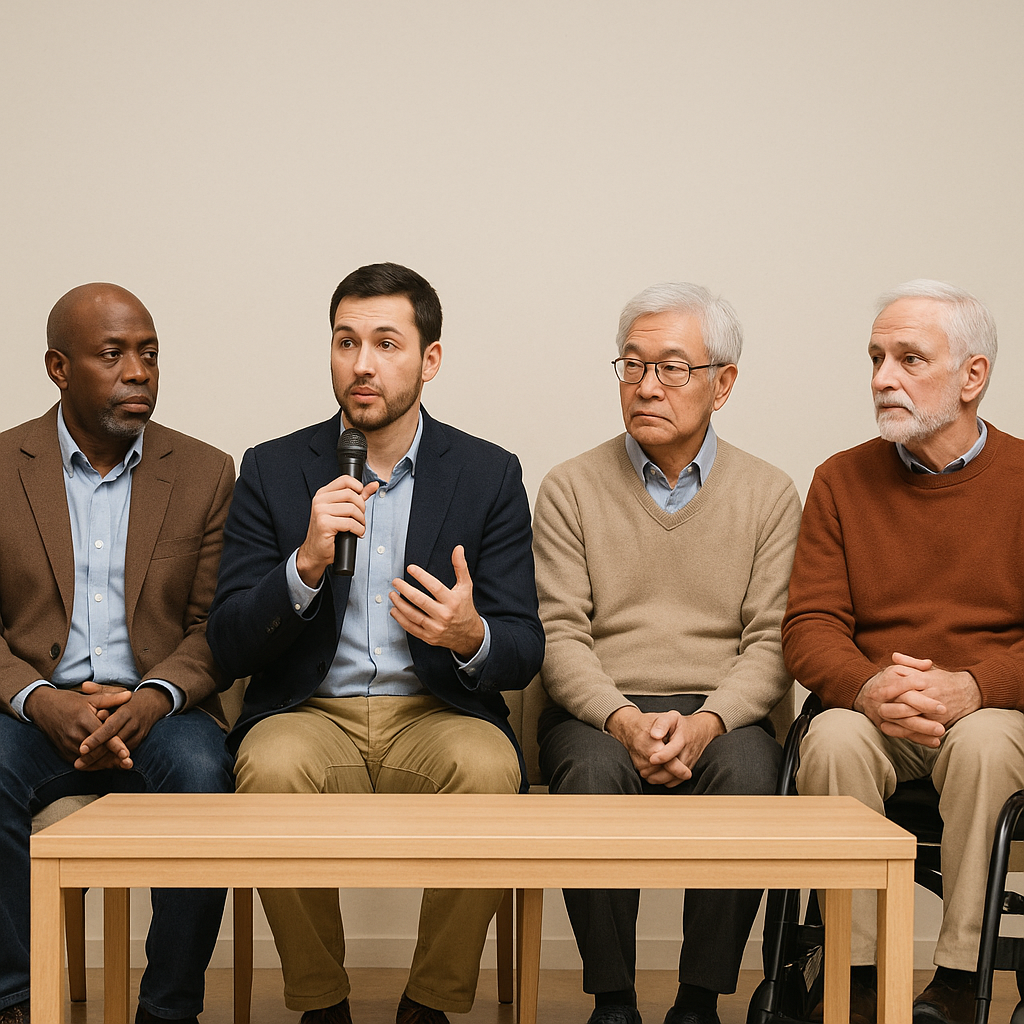Journeys of Healing and Hope When we think about childhood sexual abuse (CSA), we often fall into a rigid binary of who causes harm and who is harmed. This limited view deepens the pain that men, trans, and non-binary individuals have already experienced. The truth is: men can be survivors too. “According to the 2014 GSS [General Social Survey], in that year, the majority (83%) of sexual assaults were not reported to police. Only five percent of sexual assaults were reported. In three studies completed by Justice Canada with survivors of sexual assault, over two-thirds of those in the male sample (68%) (2019, Government of Canada)” Join us for a powerful all-male panel discussion on male survivors of childhood sexual abuse (CSA). This event will shed light on the experiences of male survivors and challenge the myths that surround them. Held at Creeds Coffee in Toronto, the evening will offer space for storytelling, connection, and community. Get Your Tickets Register today for November 5, 2025, Man Enough to Heal: Men Share Their Journeys of Healing and Hope Time: 6:00pm to 8:30pmLocation: Creeds Coffee Bar 450 Dupont Street, Toronto, ON M5R 3P3Cost: $20 per ticket All proceeds raised support The Gatehouse charity. Get tickets here To uplift and support male survivors purchase your tickets at: https://www.zeffy.com/ticketing/man-enough-to-heal-men-share-their-journeys-of-healing-and-hope Are you a male CSA survivor? A student, educator, or professional in the healing field? A community member passionate about supporting survivors? You are warmly invited to attend. Man Enough to Heal is not a lecture. It’s an evening of truth-telling, solidarity, and hope. A night to break the silence and remind survivors everywhere: you are not alone. Other Male Survivor Supports If you or anyone you know might be looking for support, please reach out to The Gatehouse for judgment-free, caring, client-centered support with our phase 1 and 2 peer support programs which you can learn more about here: https://thegatehouse.org/programs-and-services/peer-support/phase-1 You can also call the male survivors of abuse crisis line, which is 24/7 and multilingual: 1-866-887-0015, or check out A Time for Men sexual abuse survivors group: https://bloorwestpsychotherapy.ca/a-time-for-men-groups
Learning to say NO and not feel guilty about it!
Written by: Sienna Wallwork, BSc. Family & Community Social Services, Program Assistant Saying No without Guilt Whether we like it or not, there will always come a time when we have to say no to something that is requested of us. We may not have the mental or physical energy, or it is just simply something we cannot do. This can be especially challenging when it is a person we are close to or care deeply for, as we do not want to let those around us down. It is very common to have feelings of guilt after saying no, but you should be aware that you have not done anything wrong and therefore have nothing to feel guilty for. We all have boundaries and limits, and there are simply some things that we cannot do. If someone asks you to do something and you are unable to (for any reason), you should not feel bad saying no. It is important to take care of yourself, and self-care is not selfish. By saying no you are protecting yourself and your energy, and saving it for later tasks. It is very easy to feel guilty when saying no because we feel like we are letting down or hurting the other person. It is important to keep in mind that by saying no, you are not causing any harm to the other person. Although they may have wanted you to do something, at the end of the day you are still your own person who possesses the right to say no. Reduce Your Guilt When Saying No There are ways to reduce your guilt when saying no. First, try to tap into your emotions and figure out the source of your guilt. Are you feeling like you let them down? Like you owe them something? Once you are able to identify the source of the guilt, you can address it to prevent it from occurring again (Kaveh, 2021). Second, it is important to remember the upsides of saying no. By saying no to someone else, you are allowing yourself more room for the tasks and things that are important to you. This is important for your well-being and self-care, so try not to feel bad for prioritizing yourself. Finally, you should do your best to say no without apologizing. Although you may feel bad, you can offer an explanation without apologizing. Try not to say sorry because you do not have anything to be sorry for, and if you continue to apologize when you say no you are reinforcing the idea that you “should” feel bad (Hendriksen, 2020). Overall, it is important to remember that saying no is a skill. Like any other skill, it will take time to develop. If you are kind and patient with yourself, remind yourself why you are saying no and why it is okay to, and do your best to not apologize for putting yourself first, you may find it easier to develop this skill with time (Kaveh, 2021). References Hendriksen, E. (2020, March 17). How to say no (without feeling guilty). Retrieved July 22, 2022, from https://www.quickanddirtytips.com/health-fitness/mental-health/how-to-say-no-without-feeling-guilty?page=1 Kaveh, D. L. (2021, December 4). A therapist shares 10 tips to stop feeling guilty about saying “no”. YourTango. Retrieved July 22, 2022, from https://www.yourtango.com/experts/washington-psychological-wellness/how-to-say-no-without-feeling-guilty

